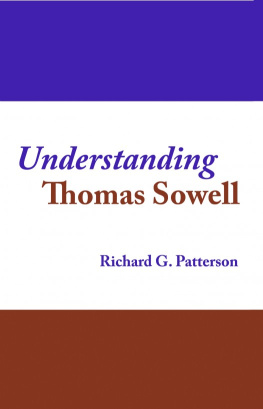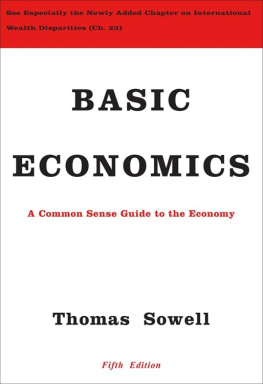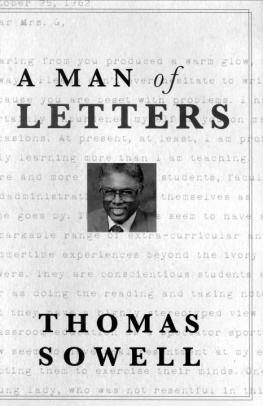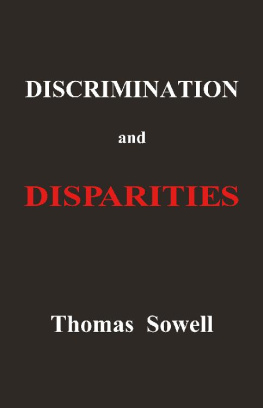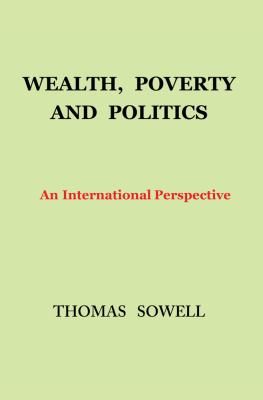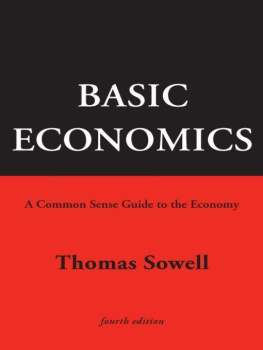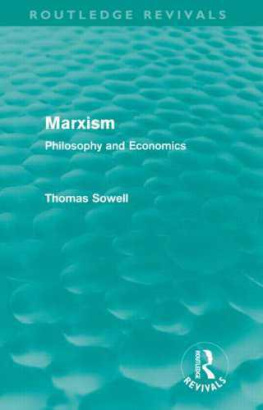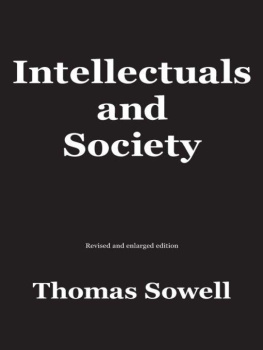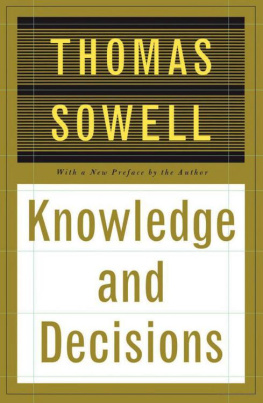Understanding Thomas Sowell
By Richard G. Patterson
Copyright 2011 Richard G. Patterson
Smashwords Edition
This book is available in print at most onlineretailers.
Smashwords Edition, License Notes
This ebook is licensed for your personal enjoymentonly. This ebook may not be re-sold or given away to other people.If you would like to share this book with another person, pleasepurchase an additional copy for each recipient. If youre readingthis book and did not purchase it, or it was not purchased for youruse only, then please return to Smashwords.com and purchase yourown copy. Thank you for respecting the hard work of thisauthor.
Government, business, art, religion, all socialinstitutions have a meaning, a purpose. That purpose is to set freeand to develop the capacities of human individuals without respectto race, sex, class or economic status. And this is all one withsaying that the test of their value is the extent to which theyeducate every individual into the full stature of his possibility.Democracy has many meanings, but if it has a moral meaning, it isfound in resolving that the supreme test of all politicalinstitutions and industrial arrangements shall be the contributionthey make to the all-around growth of every member of society.
John Dewey
Contents
Preface
This book grew from three seeds: a lifelongpreoccupation with ideas and understanding, a growing concern aboutthe rhetoric of contemporary public debate, and a gift of ticketsto see the Wagners Ring Cycle as performed by the LA Opera.
]I found it by searching for regietheater, a new term for me,which I had come across in discussions about the way productions ofWagnerian opera had changed after the Second World War. MacDonalds rhetorical battering ram in the essay is a production ofThe Abduction from the Seraglio staged by Calixto Bieito inBerlin. Being completely unaware of trends in opera production inEurope, I was appalled by her description of this production of aMozart opera and felt inclined to cheer as she heaped scorn on thepeople and ideas behind it. Her prayer that Peter Gelb, the generalmanager of the Met, would resist the temptation to pander to fadsand uphold the glorious tradition of the Met seemed to be heartfeltand based on a deep appreciation for the music. Only later did asmall voice in the back of my mind begin to wonder if the alarmisttone of the essay might be glossing over some complexity. Myfondness for continental philosophy makes me instinctively leery offears of nihilists especially when they are viewed as trendy. Ilike my Mozart straight, and I doubt that any amount of explanationwould ever make me admire Bieitos production, but I did manage tostretch my mind sufficiently to entertain the possibility that sucha production was attempting something genuine and worthwhile. I wasat least able to grant that there might be a perspective in whichthe contemporary equivalent of 18th century Europeanfantasies about Turkish harems would be our media nightmares of thesex trade in Eastern Europe.
I became curious about Heather MacDonald and discovered that she had published a book of essaysentitled The Burden of Bad Ideas: How Modern IntellectualsMisshape Our Society. I also discovered that she was aconservative who had been described as a neoconservativebombthrower or a thinking mans Ann Coulter. I wondered if heressays might help in my attempts to ferret out the underlyingassumptions that separate liberal and conservative views. I foundher essays well written but difficult to read, partially becauseshe was attacking ideas I found sympathetic and partially becauseof the deliberately provocative nature of her rhetoric. Ieventually concluded that, while some of her rhetorical techniqueswere ultimately harmless, she had a tendency to misrepresent thepositions of writers she was attacking in a way that seemed to meto be disingenuous, and there was something suspect about the wayshe moved from extreme examples to generalized conclusions. I wasalso disturbed by her conclusion that the only reason intelligentpeople clung to the views and policies she criticized was becauseit made them feel morally superior. This was not the first time Ihad heard this explanation of liberal policies, but it seemed a bitself-defeating coming from Mac Donald, whose own brand ofconservatism was more than a little tinged with snobbishness basedon her own education and appreciation for the finer aspects ofWestern culture.
References in some of Mac Donalds essayspointed me to Thomas Sowell, who seemed as though he might providea more fruitful starting point for my inquiries. In particular hehad a book entitled A Conflict of Visions, which appeared toaddress the very issue that interested me. If I had heard Sowellsname during the heated debate of affirmative action in the 1980s, Ihad long since forgotten it, and I was completely unfamiliar withhis work, although I knew of the Hoover Institution where he is afellow. I discovered that Sowell had written four books over theyears reiterating and elaborating on the central underlyingassumptions in his commentary on a range of issues: Knowledgeand Decisions (1980), A Conflict of Visions: IdeologicalOrigins of Political Struggles (1987), The Vision of theAnointed: Self Congratulation as a Basis for Social Policy(1995) and Intellectuals and Society (2009). As the title ofhis 1995 book indicates, his writing is not without some degree ofprovocative rhetoric or even sarcasm, and his shorter articles orop-ed pieces can often be interpreted as provocative. His books,however, are for the most part sober and systematic presentationsof his ideas.
Sowell was aneconomics professor for 18 years before joining the HooverInstitution full time in 1980. Although he says he was a Marxistwhen he was a student, he got his Ph.D. from the University ofChicago, where he went in order to study under George Stigler.Milton Friedman was his advisor and gradually over a decade Sowellabandoned his Marxist leanings in favor of a neo-classicaleconomics. The main inspiration for the theories elaborated inKnowledge and Decisions was an essay by F.A. Hayek from 1945entitled The Use of Knowledge in Society which had been gestatingin his mind for years.
Sowellapproaches all social and political issues using an economic model.In the interest of full disclosure, I shall confess that economicswas the only course in college that I did not love. I shall alsoconfess that I am a lifelong Democrat with progressive leanings whoenthusiastically voted for Obama. Some might wonder why I woulddevote so much time and effort to Thomas Sowell, who is surely notmy cup of tea. The short answer is that I am so discouraged by thelack of substantive public debate at a time when the country seemsto be sharply divided on so many social and political issues that Ifeel compelled to try to make some kind of positive contribution.My hope is that by focusing attention on the assumptions underlyingone perspective on the debate and trying to see where or how my ownviews diverge from this perspective, I can encourage others tothink about what is really at stake behind all the rhetoric andname-calling.
It might seem that Sowell has already providedthis service in A Conflict of Visions. One problem I havewith the book is that it seems, at least on first reading, to implythat the current political conflicts are based on diametricallyopposed and completely irreconcilable visions of man and society.This is one of the things I intend to explore in some detail, butone can easily come away from the book thinking that there is noway to resolve such a basic conflict except for everyone to choosethe same side.
Ronald Dworkinsbook, Is Democracy Possible Here? Principles for a New PoliticalDebate, is an admirable attempt to delineate a common groundshared by liberals and conservatives in the US in order tofacilitate genuine debate. I trust that my efforts will not be seenas competing with his but rather as supplementing them byapproaching the issue from a different perspective. One of thethings that has struck me in reading conservative literature that Iwould not normally read is the impossibility of generalizing aboutthe views held by conservatives. Sowell does not consider himselfa conservative. He prefers no label but has said he may be closerto a libertarian than a conservative except for his views onnational defense policy. A lot of what Sowell and Mac Donald sayseems to overlap, but the more closely I read each, the more awareI become of how different they are both in terms of their startingpoints and their destinations. Individual differences become evenmore obvious as I read George Will or Richard Posner. If there is abridge to be crossed, it is best to start with a single thinker andto progress in very small steps by a close reading of what he orshe actually says. My starting point here will be Sowells book

